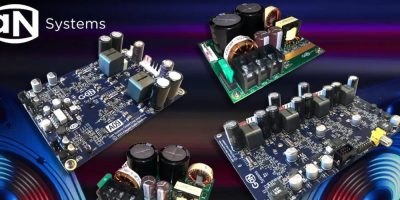Class D GaN FET amplifiers boost audio performance, says GaN Systems
Building blocks to create audio systems have been released by GaN Systems. The company has released two Class-D GaN FET amplifier boards and two audio boost converters for marine, automotive and battery-powered vehicles.
GaN Systems provides amplifier designs, power supplies and boost converters allowing audio systems designers to mix and match designs to maximise performance for specific applications.
The designs are optimised for sound quality, efficiency (with no heatsinks), size and cost for premium audio products designed “more quickly at affordable prices while reducing time to market”.
The two high voltage boost converter reference resigns include a 210W continuous / 300W peak power source and a 300W continuous / 500W peak power source for manufacturers of standalone mono, stereo and multi-channel automotive and marine amplifiers. The complete audio boost converter includes wide range DC supply voltage input from 9V DC to 16V DC operation, 32V output and are load dump compatible with differential primary drive transformer topology.
The OL200DS and CL200M are self-contained 200W per channel Class D amplifier modules designed for manufacturers of powered loudspeakers and standalone stereo and multi-channel amplifiers. The GaN Systems OL200DS is designed as two independent half-bridge outputs for both stereo and single-channel applications. The GaN open loop approach provides a switching form for Class D amplifiers with fewer downsides than silicon, said GaN Systems. The high switching signal performance delivers a dual feedback loop that performs better than a single loop / closed filter.
The OL200DS features 200W per channel, 8.0 Ohm and two BTL (bridge tied loads) or 50W per channel and watts/channel, 8.0 Ohm and four half bridges. The total harmonic distortion is less than 0.1 per cent (THD+N 200W) and signal to noise ratio is above 114dB.
The CL200M does not require a heat sink under normal conditions. Thermal protection is provided for worst-case thermal environments, and 96 per cent efficiency reduces heat and system size, said GaN Systems.




